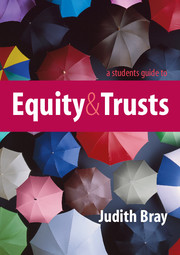Book contents
- Frontmatter
- Contents
- Preface
- 1 Historical introduction
- 2 Equitable remedies
- 3 The classification of trusts and powers
- 4 The three certainties
- 5 Constitution of trusts
- 6 Formalities for the creation of a trust
- 7 Private purpose trusts
- 8 Unincorporated associations
- 9 Resulting trusts
- 10 Constructive trusts
- 11 Trusts of the family home
- 12 Secret trusts and mutual wills
- 13 Charities; the Charities Act and the rules of cy près
- 14 Trustees: appointment, retirement and capacity
- 15 Duties and powers of trustees
- 16 Variation of trusts
- 17 Fiduciary duties and breach of fiduciary duties
- 18 Breach of trust and defences to breach of trust
- 19 Remedies against strangers to a trust
- 20 Tracing
- Index
19 - Remedies against strangers to a trust
- Frontmatter
- Contents
- Preface
- 1 Historical introduction
- 2 Equitable remedies
- 3 The classification of trusts and powers
- 4 The three certainties
- 5 Constitution of trusts
- 6 Formalities for the creation of a trust
- 7 Private purpose trusts
- 8 Unincorporated associations
- 9 Resulting trusts
- 10 Constructive trusts
- 11 Trusts of the family home
- 12 Secret trusts and mutual wills
- 13 Charities; the Charities Act and the rules of cy près
- 14 Trustees: appointment, retirement and capacity
- 15 Duties and powers of trustees
- 16 Variation of trusts
- 17 Fiduciary duties and breach of fiduciary duties
- 18 Breach of trust and defences to breach of trust
- 19 Remedies against strangers to a trust
- 20 Tracing
- Index
Summary
Key points
in some circumstances a stranger to a trust may be held liable as a constructive trustee;
a stranger may be liable if he has received trust property knowingly;
a stranger may be liable if he has assisted in a breach of trust dishonestly;
a stranger may be liable if he has become a trustee de son tort;
the test for dishonesty is an objective test although the court can look at the state of mind of the defendant;
traditionally knowing receipt depended on proof of a requisite level of Baden knowledge;
today knowing receipt depends on proof of unconscionability;
a stranger is liable for knowing assistance if he satisfies the test for dishonesty; and
a trustee de son tort is someone who holds trust property not as a trustee but behaves as a trustee in relation to that property.
Introduction
In some circumstances a person may be liable as if he is a trustee when he becomes involved in some way with a trust. The court can then make that person personally liable for breach of trust. The stranger will be liable to compensate the trust fund for any losses suffered. This will be particularly important where the trustees cannot be found or the trustee is bankrupt and therefore has no funds with which to compensate the trust fund.
- Type
- Chapter
- Information
- A Student's Guide to Equity and Trusts , pp. 330 - 347Publisher: Cambridge University PressPrint publication year: 2012



